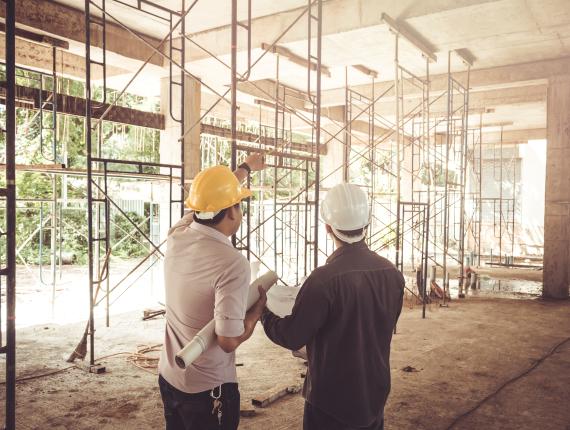Advancing Energy Codes
Building a path to net zero for commercial and residential new construction

Energy codes are building codes, like fire or safety codes, that regulate the energy efficiency of newly constructed buildings and existing buildings undergoing renovations. In Minnesota, every code is statewide, ensuring all buildings meet the minimum energy performance requirements.
Advancing energy codes plays a critical role in reducing energy bills for owners and occupants, cutting carbon emissions, and improving indoor comfort. This work is led by the Minnesota Advanced Energy Codes Partnership, which also supports broader goals — helping Minnesota reach net zero in new construction by 2038, improving code compliance across sectors, building a workforce for the next generation of buildings, and ensuring all Minnesotans, especially those in disadvantaged communities, reap the benefits.
To learn more about energy codes, visit Department of Energy’s (DOE) Energy Codes 101.
The Minnesota Advanced Energy Codes Partnership (The Partnership) was established to support Minnesota’s Climate Action Framework, which calls for new commercial and residential buildings to reach net zero by 2036 and achieve significant energy and emissions reductions in existing buildings. The Partnership is advancing these goals by helping Minnesota achieve statutory requirements to improve the Commercial Energy Code by 80% by 2036 and the Residential Energy Code by 70% by 2038.
The Partnership is sponsored jointly by the Minnesota Department of Labor and Industry and the Minnesota Department of Commerce. The Partnership is led by ETA with the participation of the University of Minnesota’s Center for Sustainable Building Research, the state’s major investor-owned utilities, additional consultants, and a broad-based Advisory Council.
To meet emission reduction goals and ensure our next generation of buildings are ready for the changing climate, Minnesota has committed to advancing energy codes for all commercial buildings subject to the state building code. Recent legislation has enshrined in statute an aggressive goal of an 80% efficiency improvement in commercial energy code against a 2004 baseline by 2036.
To achieve the commercial energy code goal, the Minnesota Advanced Energy Code Partnership will work closely with the Minnesota Department of Labor and Industry (DLI) to analyze and propose amendments to the model ASHRAE 90.1 Commercial Energy code to achieve incremental improvements during the next two code adoption cycles.
To meet Minnesota’s climate goals and reduce energy use in homes across the state, Minnesota has committed to advance energy codes of all residential buildings subject to state building code. Recent legislation sets a target of 70% efficiency improvement in residential energy code against a 2006 baseline by 2038.
The Partnership will take a similar approach to the commercial path, leveraging DOE funding and collaborating with DLI to propose amendments to the model IECC-R 2024. These efforts will set Minnesota on the path to meeting statutory requirements through incremental improvements.
Advanced codes only garner intended energy savings if there is compliance. Through the BuildUp MN program, The Partnership is working to improve compliance by providing role-specific training and an online resource hub to simplify energy code compliance. The training curriculum is tailored by profession (e.g., code officials, design professionals, etc.), and the resource hub offers accessible tools to support each step of the process.
Visit BuildUp MN for online training and explore resource hub.
The Partnership works with Tribal Nations to provide tailored support to develop and update energy codes, improve energy code compliance, and other support activities identified during discussions.